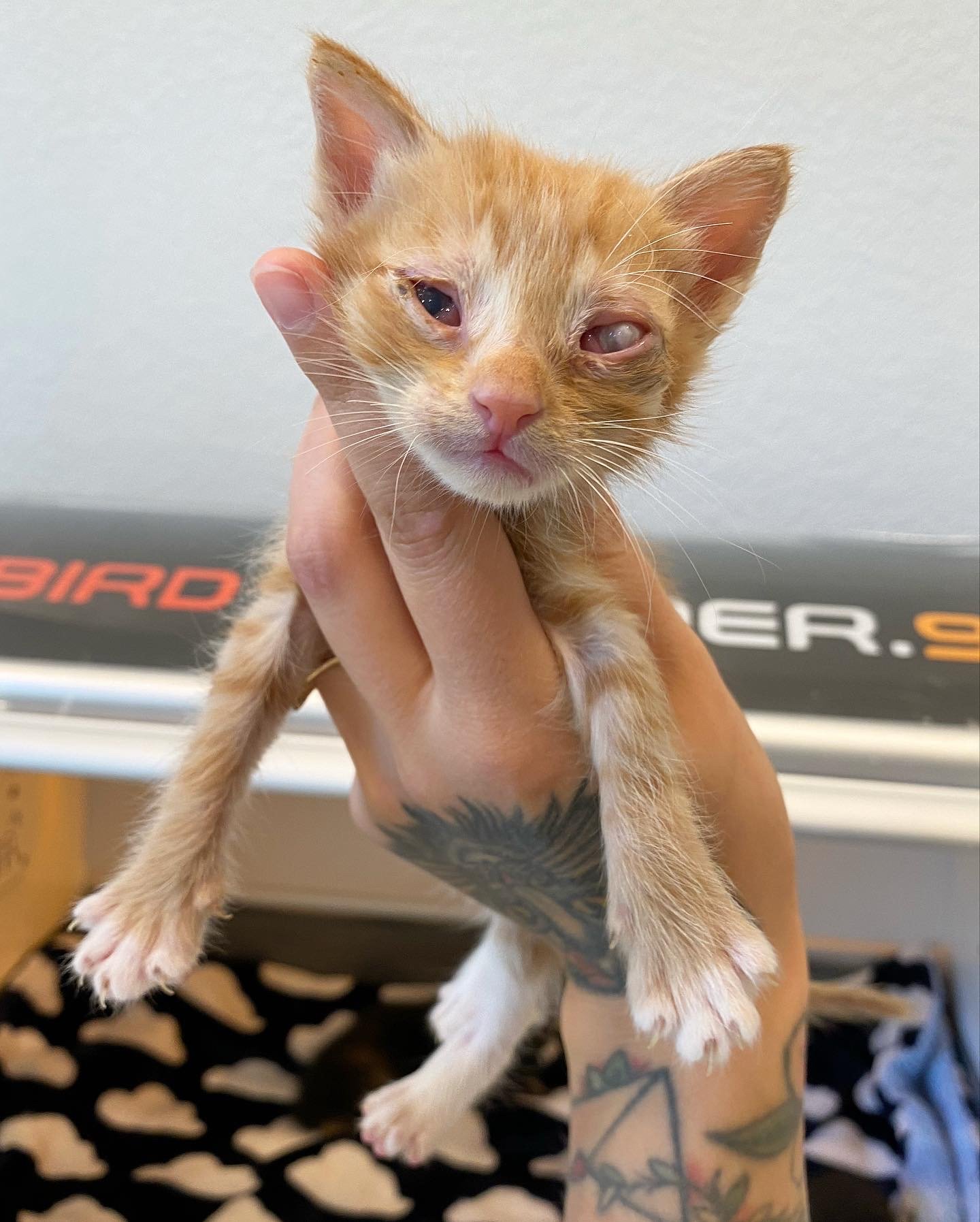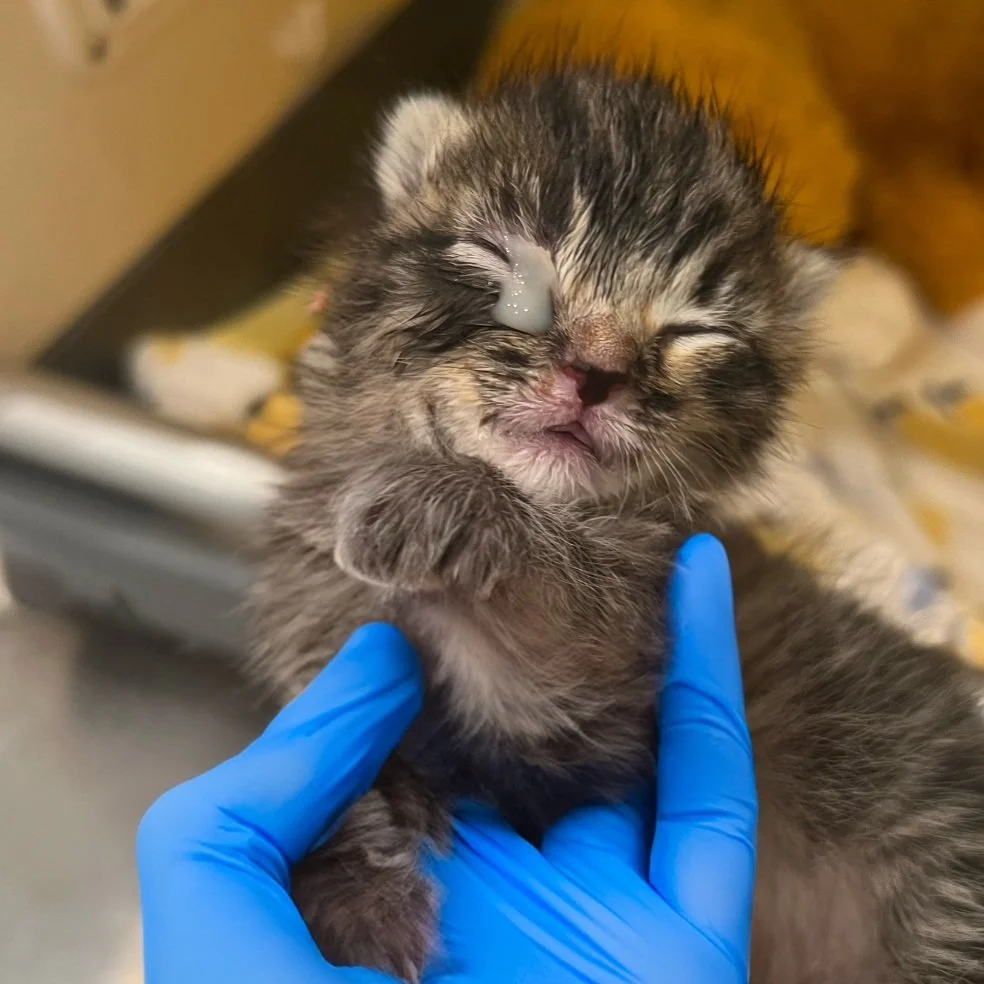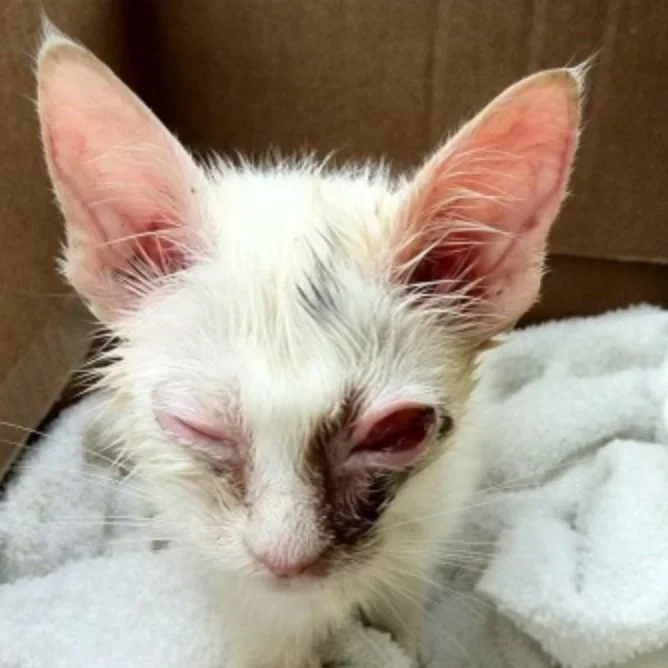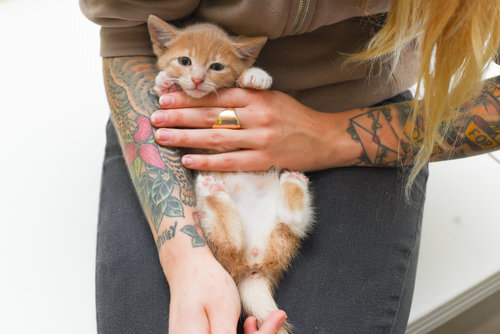Eye Infections
Oh, kitten eyes…such sensitive things! As a foster parent, you’re likely to encounter lots of kittens with eye infections. But don’t worry—with a bit of know-how and the support of a veterinarian, you’ll have all the tools you need to get your kitten on the path to healing.
Why Do Kittens Get Eye Infections?
Young kittens are susceptible to eye infections for a number of reasons. Coming from high-volume settings like animal shelters and community cat colonies, they can easily be exposed to contagious disease—and it can be a challenge for these vulnerable babies to fight disease due to being undervaccinated and having underdeveloped immune systems.
When you find a kitten whose eyes look concerning, it might be due to:
Viral disease such as herpesvirus or calicivirus, especially if accompanied by other upper respiratory symptoms
Bacterial infection, often secondary to a virus, or in some cases primary due to maternal transmission, environment, or other causes
Trauma or injury, with or without secondary infection
Congenital conditions, such as eyelid agenesis, which can lead to irritation and secondary infection
It’s important to get an examination from a veterinarian to determine the right treatment plan, as each kitten’s condition will vary in severity, cause, and need.
Example of kitten with mild eye infection associated with URI
Example of kitten with neonate ophthalmia due to calicivirus and secondary bacterial infection
Closed Eyes May or May Not Indicate Infection
It’s important to note that kittens are born with closed eyes, and they open around 8-12 days of age. If you’ve found a very young kitten with closed eyes, don’t fret. Check out my article on how to determine a kitten’s age to determine if it’s normal for the kitten’s eyes to be closed.
If a kitten’s eyes are closed and they are over 2.5 weeks of age, it’s likely they have an eye infection. Follow my steps for opening, flushing, and medicating the eyes below.
If a kitten’s eyes are closed and they are under 2.5 weeks of age, it’s likely that this is just normal kitten development. If you see evidence of crust or pus, however, they may have neonate ophthalmia, which will require you to intervene.
Learn to help young kittens with ophthalmia and eye infections:
Help Kittens With Eye Infections Step-by-Step
Identify the issue
If you see that the eye is oozing, crusted, or sealed shut (in a kitten over 2.5 weeks), the kitten likely has an eye infection. Seek veterinary support as soon as possible. Intervene right away with steps 2-4 in order to avoid the infection worsening. Early intervention is key!
Warm compress
Use a clean cotton ball with warm water to carefully compress the eye. Be cautious not to cover the nose while doing this.
Flush with saline
Use .9% sodium chloride or a cat-safe ophthalmic flush to carefully clean the eyes.
Get the eye open and clean
Leaving an infecton to sit in the eye is never the answer. Carefully wipe away discharge and get the eye open and crust-free, repeating with your flush until it is clean.
In mild cases where there is only light crust, you may find that the kitten can heal by simply keeping the eye open and clean. However, in most cases, you’ll want to proceed to step 5.Apply ointment or drop prescribed by veterinarian
A veterinarian can prescribe you the right medication for your kitten’s case. This may be an antibiotic ointment or a drop, with or without steroids depending on the kitten.
Be cautioned that steroids should only be given to kittens who have been examined and prescribed treatment by a veterinarian, as they can actually cause greater harm if there is an ulcer present. The importance of a veterinary exam cannot be overstated for this reason. If you are unable to see a veterinarian, do not apply a steroid.
In some areas, you may be able to access a common over-the-counter ophthalmic antibiotic—however it is still advised to speak with a veterinarian to ensure you are using the most effective drug for your kitten’s case.Continue as needed
Follow your vet’s instructions for frequency of treatment.
Treating Severe Cases
In some cases, a kitten’s eye infection may be severe. They may have a very swollen eye, a ruptured eye, or even abnormal adhesions of the tissues. In all of these cases, veterinary care is urgent and must be treated on a case-by-case basis with your veterinarian’s instructions.
Your veterinarian may choose to prescribe an oral antibiotic or other medication in addition to topical ointments or drops. Watch my video on how to administer an oral medication to a kitten to learn how!
Example of kitten with significant swelling of the eye due to untreated upper respiratory infection; healed well with serum and antibiotics
Example of severe conjunctivitis with abnormal adhesion (symblepharon) of the eyelid and cornea; required enucleation
Example of kitten with eyelid agenesis; required enucleation of left eye with secondary infection, and cryoepilation of right eye
For severe infections, your veterinarian may suggest serum, a blood product known to make an incredible difference for kittens with some forms of eye infections. Ask your veterinarian, and watch my video about serum for eye infections to learn more!
For kittens with congenital conditions like eyelid agenesis, other treatment options like cryoepilation and reconstruction surgeries may be advised.
Sometimes, the eye cannot be saved. You may find that it is necessary to remove one or both eyes through a surgery called enucleation. If this is the case, don’t worry—kittens can absolutely thrive with limited or no vision! Click here to read my article about caring for blind kittens.
You’ve Got This!
The bottom line is that while kittens’ eyes are very prone to infection, they recover well with the right diagnosis and treatment plan from a veterinarian, as well as swift intervention from a caring person like you. Thank you for helping them!
If you’re passionate about eye health in kittens, consider donating to my nonprofit Orphan Kitten Club, which is funding lifesaving ethical research to help kittens with eye infections thrive.










